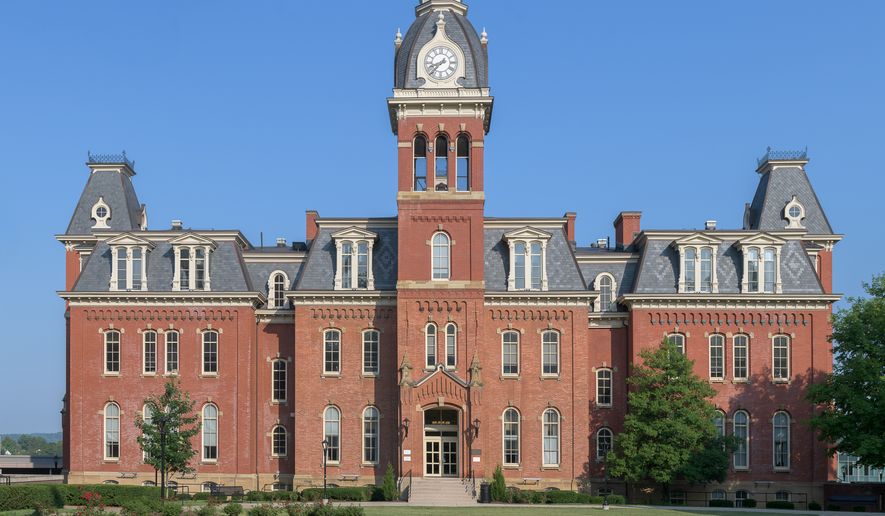West Virginia University officials have suspended a contentious proposal that would have advanced professors doing diversity work while making it easier to fire tenured colleagues whose work is deemed subpar.
“The provost has decided to suspend work on the revised promotion and tenure document for now,” W. Scott Wayne, chair of the faculty senate, told The Washington Times. “We will continue to operate under the 2014 guidelines.”
Colleges and departments in the university “are free to incorporate elements of the new procedures into their promotion and tenure documents” with help from the provost’s office, said Mr. Wayne, a professor of mechanical and aerospace engineering.
The decision comes after professors voted 494-221 last month against the “equity minded” revisions to the school’s guidelines for faculty appointments, evaluations, promotions and tenure.
Officials at the public research university in Morgantown initially said they hoped to save the proposal, which had already undergone several revisions in the face of withering criticism.
But the provost’s office informed the faculty senate on Monday that it would cease “working on any update of this document that supposedly needs to be updated,” said R. Scott Crichlow, a WVU associate professor of political science and faculty senator.
“There’d been complete silence since the faculty vote,” Mr. Crichlow told The Times.
Suspending the proposal does not prevent it from resurfacing in the future, said Shauna Johnson, WVU director of news communications.
“During Monday’s meeting, the provost told members of the WVU Faculty Senate what happens next with the document is up to them,” Ms. Johnson said in an email.
According to Ms. Johnson, a faculty committee representing all departments began meeting weekly in February 2021 to recommend updates to the tenure document.
The proposed changes would have added “contributions to recruiting, advising, retaining and graduating students from historically under-represented groups” to the criteria for hiring and promotions.
A new introduction in the proposal calls it a “moral imperative” for the public research university in Morgantown to promote diversity, equity and inclusion in tenure decisions.
The proposal also would have let administrators flag tenured professors as “unsatisfactory” during annual performance reviews and fire them if they do not complete improvement plans.
University officials insisted the promotion of diversity-based hiring and the firing of tenured faculty in the document were unrelated.
A committee revised the document several times, removing passages that sparked fierce pushback from tenured instructors during feedback sessions and from academic freedom advocates outside the school.
Those compromises included deleting new requirements that would have tied tenure decisions to the school’s code of conduct and a post-tenure review after five years.
The school also attempted to add an “opt-out option” that would have allowed faculty to seek promotion under the old tenure system until the 2027-28 school year.
But according to Mr. Crichlow, the proposal would have still sped up the firing of tenured professors based on existing annual performance reviews. And many of his colleagues lost trust in the process after reading the first draft in November, he said.
Resistance from tenured professors prompted the faculty senate on Dec. 5 and again on Jan. 16 to delay voting on the document. That set the stage for the full faculty to vote against the proposal on Jan. 19, sending it back to the provost’s office.
WVU evaluates professors for tenured positions based on their teaching, research and service work.
In the U.S., tenure has traditionally offered professors protection against being censured or targeted for political reasons.
But that protection has come under increasing pressure in recent years at a handful of campuses that have looked to make it easier to get rid of tenured professors.
The WVU proposal would have counted “learning activities that support inclusivity and diversity in the classroom and extracurricular activities outside of the classroom” toward tenure.
“WVU also seeks to achieve national and international impact and is committed to equal opportunity, affirmative action, social justice and the elimination of discrimination and harassment,” the revised document states.
Some academic freedom advocates on Tuesday welcomed WVU’s decision to suspend the proposal.
“It’s important that tenure was preserved here because it’s one of the key guarantors of academic freedom on campus,” said Jeremy C. Young of PEN America, a national free speech advocacy group that opposed the revisions. “That’s going to continue at WVU because of this decision.”
• Sean Salai can be reached at ssalai@washingtontimes.com.




Please read our comment policy before commenting.